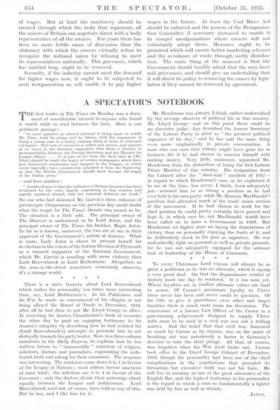Mr. Henderson was always, I think, rather underValued by the
average observer of political life in this country. Mr. Lloyd George—and on this point there •coulct 'be no shrewder judge—has described the former 'Secretary of the Labour Party in print as " the greatest political organiser of his day," and he has said the same thing 'even more emphatically in private conversation. A man who can 'earn that tribute might have gone' far in business life if he had chosen to concern himself with 'making money. .Very little, moreover, separated. Mr. 'Henderson from the distinction of being the first Labour Prime Minister of this country. His resignation from the Cabinet after the " door-mat " incident of 1917— in regard to which Henderson's case, as he explained it to me at the time, has never, I think, been. adequately put—restored him to as strong a position as he had ever held in his own party, while Mr. Ramsay MacDonald's pacifism had alienated much of the trade union section of the movement. If he had chosen to work for the chief position he could pretty certainly have gained and kept it, in which case he, not MacDonald, Notild. have been called on to form a Government in 1928. But Henderson set higher store on laying the foundations of victory than on personally enjoying the fruits of it, and he deliberately stuck to his post as organiser: He was undoubtedly right on personal as well as private grounds, for he was not adequately equipped for the arduous task of leadership of the House of Commons. * * * •


























































 Previous page
Previous page